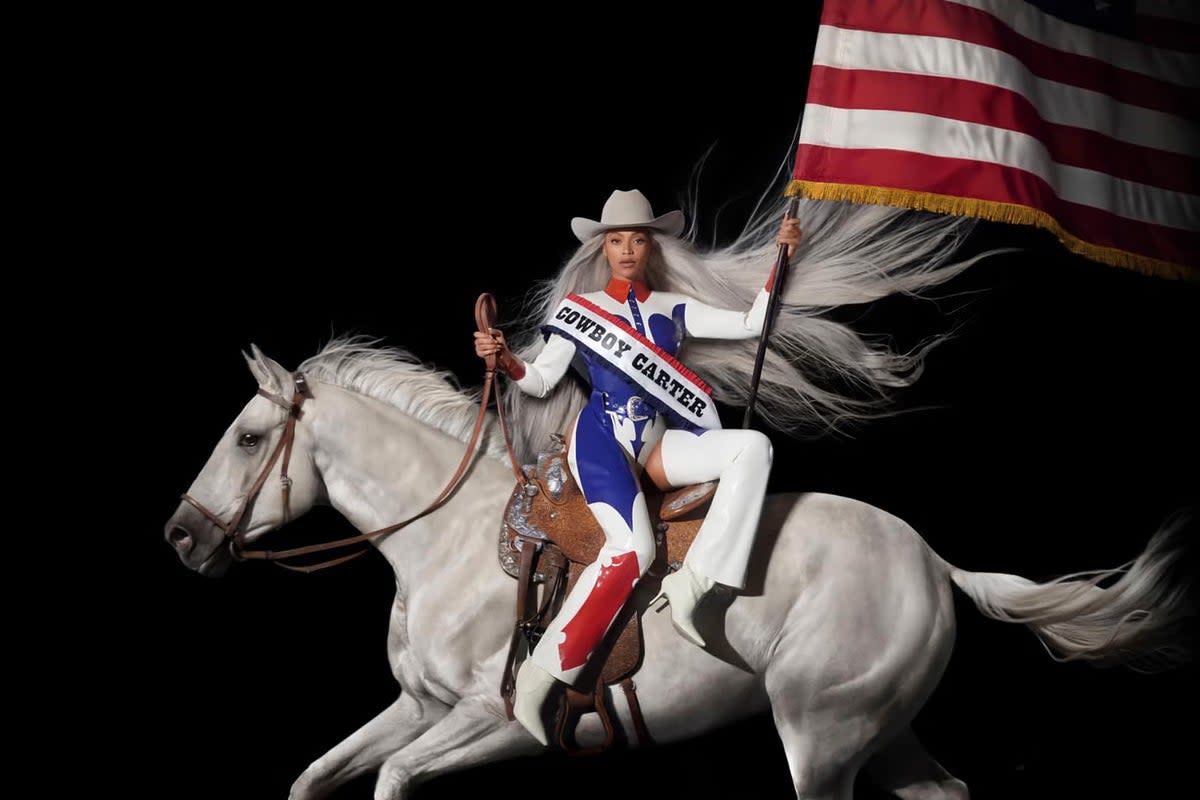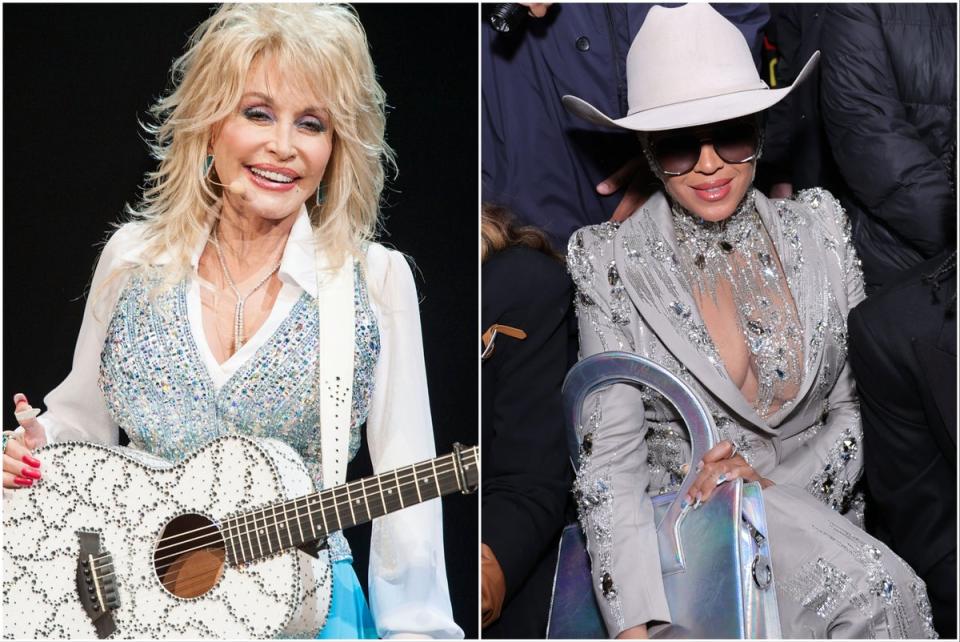Beyoncé review, Cowboy Carter: Her hands are on the reins of every country music trope

“Now is the time to face the wind,” Beyoncé hollers at the outset of her breathtaking eighth album, Cowboy Carter. It’s a record that hurls a lasso around the neck of country music and rides it out into the desert for a good airing. This is Beyoncé’s thrilling mission to take up space for Black women in a genre historically dominated by white men. Across 27 tracks, almost all with compellingly muscular melodies, she whips and neigh-neighs through every conceivable form of classic and modern country, roping in elements of opera, rock and hip-hop at her commanding, virtuosic whim.
Already, the irresistible chaps-slapper of “Texas Hold ’Em” has made her the first Black woman to top the country chart. Cowboy Carter keeps on dealing aces. It opens with the solemn vow of “American Requiem”, a track that takes listeners back to the moment Beyoncé felt pushed to take this stetson-clad stand. When the Texan star reminds us of trying to sing over “chatter in the room”, she’s referring to the racist and sexist reaction she experienced during her appearance at the 2016 Country Music Awards, where she performed with the country trio The Chicks.
The all-female band know what it means to be “cancelled” by the country music industry; they suffered an intense backlash for criticising George Bush’s war in Iraq in 2003. It was a moment that left female country artists feeling politically gagged and unable to express their views for fear of being (in Nashville slang) “Chicked” themselves, so that even established female legends of the genre, such as Dolly Parton and Shania Twain, toed the line.
Because I’ve not seen reviews so far giving the stats Beyoncé’s here to buck, I’m going to drop some here. When Patsy Cline (the first woman to wear trousers on the grand Old Opry) hit the country charts in the mid-1950s, “girl singers” got around 13 per cent of the airplay on country radio, which had a policy of not playing said “girl singers” back to back.
Today the percentage is, shockingly, the same. The 2010s also saw the rise of “bro-country”, which mixes elements of electronic music and hip-hop with classic country. Steve Earle called it “hip-hop for people who are scared of black people”. The genre’s ingrained misogyny has been flagged by older country artists including Kenny Chesney, who noted that “over the last several years, it seems like anytime anybody sings about a woman, she’s in cut-off jeans, drinking and on a tailgate… they objectify the hell out of them”. A study by researchers at the University of Mississippi found that the country music of 2000 “celebrated whiteness far more often than in the 1980s and 1990s” with more mentions of “red or blond hair, freckles, blue eyes and sun-tanned skin” and no increase in mentions of more racially ambiguous features, such as brown eyes.
Beyoncé drives a coach and horses through all this by owning every country trope, from the haunting murder ballad “Daughter” (on which she laments the blood on her designer couture) through to the Marlboro Man she straddles “like a mechanical bull” on the terrifically fierce “Sweet Honey Buckin’”. On the bonkers “Ya Ya”, she tells us she’s above “petty” prejudice because she’s “a clever girl”. A boast she then backs up by spinning a sample of Nancy Sinatra’s “These Boots are Made for Walkin’” into quotes from The Beach Boys’ “Good Vibrations”, staking her family’s claim to life in America and calling on her ladies to “pop it, jerk it, let loose” to a funky country soul groove. She brings in the too-often forgotten Black country star Linda Martell (whose terrific 1970 album Colour Me Country deserves digging out).
In over 80 minutes of music, there are some snaggers and some growers. I was disappointed by “Levii’s Jeans”, her hotly anticipated duet with Post Malone, which doesn’t quite spark the chemistry its figure-hugging lyrics seek. But I was tickled by the dive-bar funk and helium-high vocals of “Oh Louisiana”, and the river baptism harmonies of “Alligator Tears”. My money’s on the 1970s AM rock of “Bodyguard” to sneak up on fans, with an ease to Beyoncé’s delivery and a closing guitar solo that recalls the warm scent of colitas in the air.
Her version of Paul McCartney’s “Blackbird” is a faithful one, but she shows her teeth on a cover of Dolly Parton’s “Jolene”. The track is introduced by Parton herself, who tells “Honey Bee” that her reference to love rival “Becky with the good hair” reminded her of the threat she faced from her auburn-haired seductress back in the day. But where Parton once “begged” her competitor to back off, Beyoncé “warns” her with menaces.
Through the years, women of country music have sung about the trials of marriage and motherhood: Beyoncé taps deep into this tradition by defending her 20-year union with Jay-Z on “Jolene” and, on the reckless “Flamenco”, presenting the couple as a team as she passes him a gun. She swaps her hubby out to ride shotgun with gal-pal Miley Cyrus on “Most Wanted”. Cyrus assured rasp makes for a powerful contrast with Beyonce’s fluid runs.

Throughout it all, Beyoncé’s hands are confidently and charismatically on the reins. The righteous zeal of her mission, and the giddy range of sonic adventuring, repeatedly gave me chills I haven’t felt since the release of Lemonade. Back then she was fighting for her marriage. Now she’s fighting for a major culture shift. Throughout, she seeks to build bridges with the working men of the South, acknowledging their economic struggles.
She joins them in waving their red white and blue flags. On closer “Amen”, the wealthy diva reaches out: “I see you hurting, see you hurting badly.” America’s history needs to be laid bare, she asserts: “The statues they made were beautiful/ But they were lies of stone.” She ends with a call for unity: “We’ll be the ones/ American/ Them old ideas/ Are buried here.”
It’s a reminder that country music has always been about “three chords and the truth”. Beyoncé’s truth shines here with the fierce strength of the Texan sun. Cowboy hats off to her.


